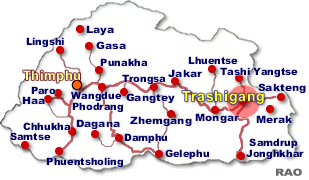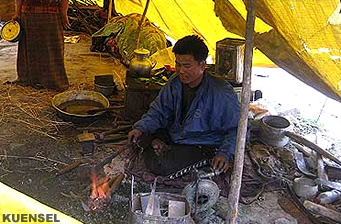| Bhutan
- Ethnic Groups & People |
 |
Bhutan's People |
|
 |
Bhutan Information |
|
|
 |
|
Travelling
blacksmiths
|

|
 |
| It
is six in the morning and blacksmith Karma Tshering readies his tools at
his work place near the entrance of the tent. At the other end his wife
cooks breakfast on a stone-made stove.
An
hour later villagers start to flock to the tent, which has been pitched
below a paddy field, at the heart of the village. It is Karma Tshering's
first day in Bikhar, Trashigang. |
|
Many
blacksmiths in the east still practice the tradition of zokor, an age-old
custom where blacksmiths move from place to place in search of work and
Karma Tshering is one of them.
According
to Karma Tshering, his ancestors had practiced the tradition and his father
continued the trend. "I used to accompany my father when he traveled from
one village to another and at the age of 15, I started to move on my own,"
the 28-year old blacksmith said.
 |
| Karma Tshering at work |
| Their
stay in a village depended upon the availability of work and it varied
from a week to months. "If we get customers we stay back otherwise we move
to the next village," he said. He had travelled to villages in Pemagatshel
and Samdrup Jongkhar dzongkhags.
Earlier
Karma Tshering carried his home - tents, clothes, food, and raw materials
- on horses but with the coming up of farm roads in the villages, he now
hires taxis. |
|
Upon
reaching the village, he went from door to door informing people about
his arrival and also sold some of the ready-made products. "It is mostly
farm tools and kitchen ware that villagers demand," he said.
Karma
Tshering said he carried a limited amount of ration to avoid excess load
and bought what was needed from the villagers. He also bartered his products
with rice and maize.
Villagers
said that they always looked forward to the zokors and saved their damaged
and broken utensils and tools for the zokor to repair.
"Even
if we have blacksmiths in our village they lack certain skills," said Zangmo,
who placed an order for two ladles with Karma Tshering. "Zokors are usually
more talented and good with their work."
Elderly
local residents said that number of zokors visiting the village had decreased
over the years. "Before more than 30 zokors visited the village in a year,"
said 74-year-old Sonam. "They were mostly from Radhi, Bidung, and Galing."
Karma
Tshering said that with resident blacksmiths in villages his customers
had decreased. In winter income was low as there was not much agriculture
work.
Karma
Tshering said that life as a zokor was not easy. It was near impossible
to make long-term friends as they had to move on before getting to know
anyone properly. "We carry our home wherever we go. If we stop, it is an
end to our livelihood," he said.
| Contributed
by Kesang Dema, Kuensel, Bhutan's National Newspaper, 2006 |
 |
top
| Information on Bhutan |
 |
|



